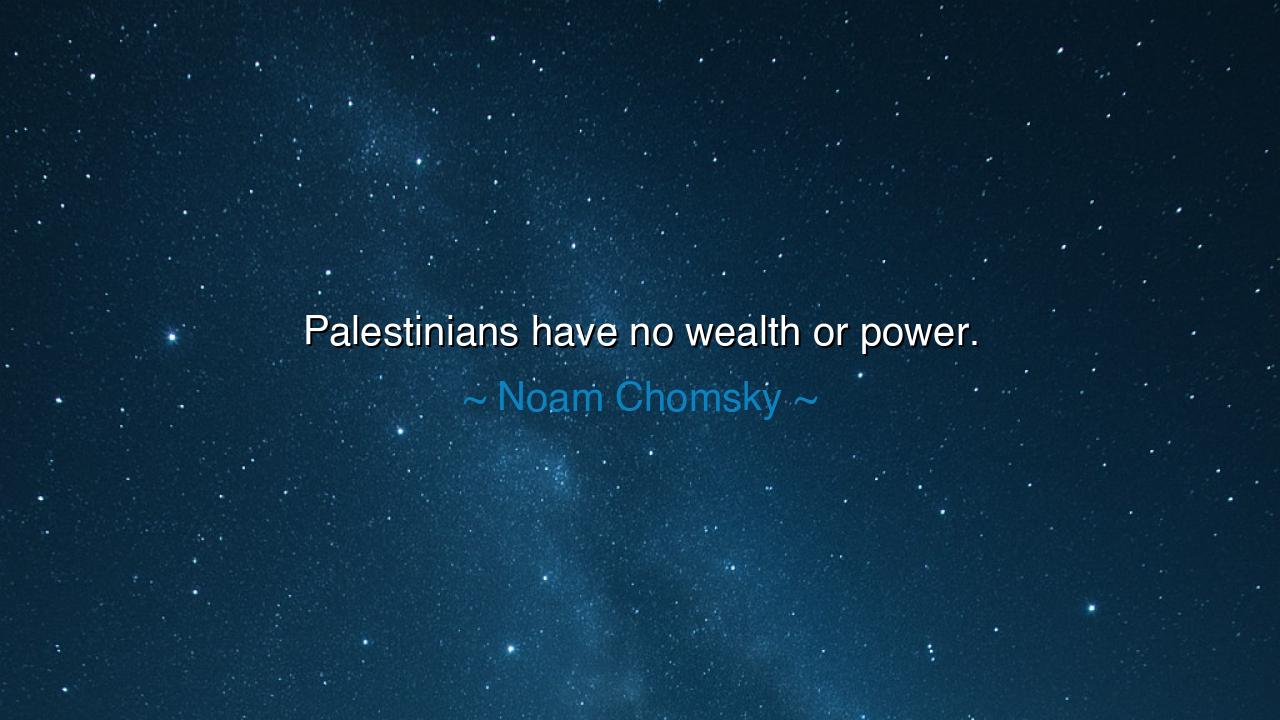
Palestinians have no wealth or power.






The words of Noam Chomsky strike with the blunt weight of injustice: “Palestinians have no wealth or power.” In this stark statement, he unmasks the plight of a people long bound by struggle, stripped of the resources that sustain freedom and the strength that commands respect. For without wealth, a people are denied security and opportunity; without power, they are silenced in the councils of nations. To name this truth is to confront the imbalance of the world, where some stand armored in prosperity while others endure in deprivation.
The absence of wealth is more than poverty of coin. It is the loss of land, homes, and livelihoods, torn away through generations of conflict and exile. The absence of power is not only political weakness but also the weight of living under occupation, where choices are narrowed, and voices are muted. Chomsky’s words carry not the coldness of analysis but the fire of moral witness, pointing to a people denied the means to shape their own destiny.
History offers parallels. The Irish under English rule for centuries knew the pain of having no wealth of their own, their lands seized and their voices silenced in Parliament. The native peoples of the Americas, driven from their lands, found themselves powerless before empires that claimed dominion. Yet in both stories, endurance was their weapon, memory their strength, and the will to persist their hidden power, though the world denied them its recognition.
Chomsky’s declaration also reveals a paradox. Though Palestinians are said to have no wealth or power, they possess the enduring strength of identity, of culture, of resilience. These are not coins to be counted nor armies to be tallied, but they are forms of wealth the oppressor cannot easily erase. Here is the deeper lesson: that true power may yet be found in the stubborn survival of a people who refuse erasure.
Therefore, let this wisdom be handed down: the measure of a people is not only in the wealth they hold or the power they wield, but in the justice of their cause and the endurance of their spirit. Chomsky’s words are both lament and warning—that when the world denies dignity to the powerless, it exposes its own injustice. Yet from such suffering may rise a strength unseen, for history shows that those stripped of worldly might often become the very symbols of courage and hope for generations to come.






GDGold D.dragon
What stands out to me is how this observation captures more than just economics—it speaks to dispossession, displacement, and loss of autonomy. I wonder how a people sustain identity and hope when deprived of both material resources and political leverage. Maybe their strength lies in endurance, but endurance shouldn’t have to be a substitute for justice. How long can a community survive on resilience alone before it becomes exhaustion?
GPGiang Pham
This line forces me to think about the relationship between visibility and power. Palestinians are often visible in news headlines, yet that visibility rarely translates into agency. Does the global conversation about them reinforce their powerlessness by speaking for them instead of with them? It feels like a paradox—being constantly discussed but rarely listened to. That silence behind the noise is what’s most haunting.
ATLe anh tu
I can’t help but feel a mix of frustration and sadness reading this. It’s not just a description—it’s an indictment of global indifference. How can we speak of justice or peace when one side has all the leverage and the other has virtually none? I also question what role ordinary people play in maintaining that imbalance through silence or selective empathy. Maybe the real challenge is moral, not just political.
KLNguyen Tran Khanh Linh
This statement feels painfully simple yet profoundly political. It exposes how structural inequality perpetuates itself over generations. I find myself wondering—what would it take to shift this reality? Is it about international policy, economic empowerment, or changing how people perceive the conflict altogether? The lack of wealth and power seems less like a natural condition and more like a product of deliberate systems of control.
TNBao Tran Nguyen
Hearing this makes me reflect on how power dynamics in global politics often dictate who gets to be heard. If Palestinians truly have no wealth or power, how can their voices ever be amplified in a world that prioritizes economic and military strength? Maybe that’s why narratives matter so much—because storytelling becomes their only real form of resistance. But is the world even listening?